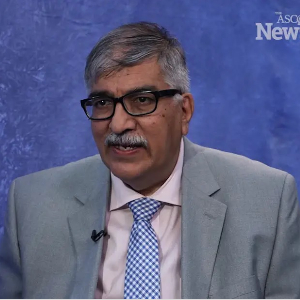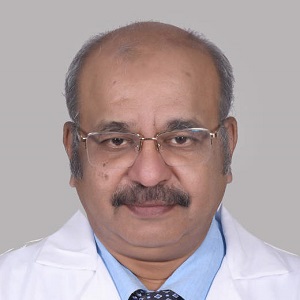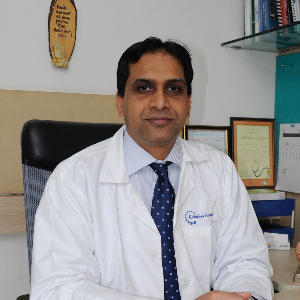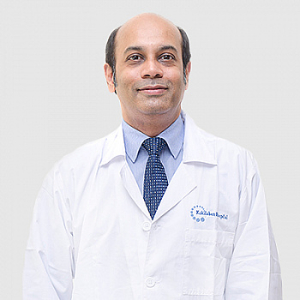Best Doctors in India for Alcoholic Hepatitis Treatment
- Pediatric Neurologist, New Delhi, India
- Over 37 years’ experience
Profile Highlights:
- Dr. Veena Kalra is one of the renowned Paediatric Neurologists in India who has garnered much respect for her contribution to a new area of Pediatrics which is Pediatric Neurology for the country.
- She practices as a senior consultant at Apollo Hospital, New Delhi.
- The President of India has awarded Dr. Veena Kalra three medals for her work in treating kids with critical illnesses and contributions to the field of pediatrics.
- She has a passion for Malnutrition and brain development, Neurocysticercosis, Childhood Epilepsy, Childhood Cirrhosis, Neuro Infections, and Neurometabolic & Neurogenetic disorders.
- Dr. Kalra not only treated children during her 37 years of practice, but she also gained experience in teaching and leading the Pediatric department.
- Dr. Veena Kalra contributed significantly towards the research on Indian childhood cirrhosis, neurocysticercosis, learning disabilities, epilepsies, neurometabolic and neurogenetic illnesses, and lead poisoning.
- Director and Head Medical Oncology/Hematology, Gurugram, India
- Over 40 years’ experience
Profile Highlights:
- Dr. Rakesh Chopra is a well-known Medical Oncologist with national and international repute as one of the best in the treatment of all types of blood cancers including leukemia, lymphoma, multiple myeloma, and bone marrow transplant.
- His specialization lies in blood cancer and also provides treatment for solid cancers of the breasts, lungs, prostate, colon, and GI.
- Radiation Oncologist, New Delhi, India
- Over 20 years’ experience
Profile Highlights:
- Dr. G K Jadhav is one of the leading radiation oncologists in India.
- He has a complex understanding of cancer biology, clinical care, and radiation physics.
- Dr. Jadhav has an experience of more than 20 years in the field of radiation oncology.
- Orthopedic surgeon, Chennai, India
- Over 35 years’ experience
Profile Highlights:
- Dr. A B Govindaraj is a leading Orthopedic surgeon who holds an extensive experience of more than 3 decades in the field and performs over 300 joint replacement surgeries annually.
- He excels in unilateral and bilateral total knee replacement, total hip replacement, and shoulder replacement surgeries.
- Neuro Surgeon & Spine Surgeon, Mumbai, India
- Over 26 years’ experience
Profile Highlights:
- Dr. Abhaya Kumar is a leading name in the field of Neurosurgery who is an expert in Minimally Invasive Spine Surgery, Brain surgery, and Stereotactic Radiosurgery and has performed more than 1400 spine surgeries and 1100 brain surgeries in KDAH alone.
- Dr. Abhaya Kumar’s primary focus includes Minimally Invasive Spine Surgery (MISS) and has handled over 800 MISS cases till date in the hospital with 96% successful results.
- IVF Specialist & Gynaecologist, Kolkata, India
- Over 10 years’ experience
Profile Highlights:
- Dr. Akanksha Jangid is a Consultant of Gynecology and Obstetrics in Kolkata currently associated with Indira IVF. The center is a highly specialized unit equipped with the latest technology in Assisted reproductive technology together with state-of-the-art infrastructure and laboratories.
- She is trained in infertility treatment and provides services for IVF, IUI, ICSI, and fertility tests.
- Pediatric Orthopedic Surgeon, Mumbai, India
- Over 15 years’ experience
Profile Highlights:
- Dr. Alaric Aroojis is a renowned Pediatric Orthopedic Surgeon in Mumbai and his expertise and primary area of specialization lie in deformity correction, cerebral palsy, and congenital anomalies. He is also an expert in performing complex pelvic osteotomy for congenital hip dislocation in young patients.
- He holds an extensive experience of more than 15 years in Pediatric Orthopedics and is highly skilled at using minimally invasive procedures for difficult limb deformity corrections.
- Cardio Thoracic & Vascular Surgeon, Mumbai, India
- Over 30 years’ experience
Profile Highlights:
- Dr. Anvay Mulay is a well-known cardiothoracic and vascular surgeon in Mumbai and one of the best heart transplant surgeons in India.
- He holds an extensive experience of close to 3 decades and has been associated with renowned cardiac hospitals in India, US, and UK.
- Dr. Mulay is one of the top surgeons for Adult cardiac procedures in India. He was the first to introduce LVAD in West and Central India when he performed the surgery on a 49-year-old patient.
- Breast Cancer Surgeon, Mumbai, India
- Over 25 years’ experience
Profile Highlights:
- Dr. Archana Shetty is a leading Breast Cancer Surgeon with a super specialization in oncoplastic breast surgery.
- She holds an experience of more than 25 years and has spent 15 years training and practicing at the best cancer hospitals in the UK.
- IVF Specialist & Gynaecologist, New Delhi, India
- Over 15 years’ experience
Profile Highlights:
- Dr. Arvind Vaid is a well-known Gynecologist and Obstetrician in Delhi specializing in IVF and infertility treatment.
- He has over a decade of experience in the treatment of infertility and has helped a number of patients in having a child through ART (Assisted Reproductive Technology).
- Dr. Arvind Vaid is trained in various infertility procedures including IVF, ICSI, IUI, and assisted laser hatching.
Best Hospitals in India for Alcoholic Hepatitis Treatment
ALCOHOLIC HEPATITIS
Alcoholic hepatitis is a liver infection, which is mainly caused by frequent, heavy use of alcohol. Fat can build up in the liver cells, which might lead to inflammation as well as scarring of the liver.
Alcoholic hepatitis might be mild or severe. A patient might even need a liver transplant if proper treatment is not provided, or if they don’t stop consumption of alcohol.
It is also notable that all heavy drinkers don’t develop this condition, and sometimes this condition even develops in people who drink moderately. However, if you are diagnosed with this condition, it is important for you to quit drinking alcohol. People who continue drinking alcohol might face a huge risk of serious liver damage as well as death.
Symptoms
Depending on the amount of damage to the liver, the symptoms can vary. If you are having a mild form of the disease, you might not even experience any symptoms at all. However, as the damage continues to grow, you might experience the following:
- Changes in appetite
- Dry mouth
- Weight loss
- Pain or swelling in the abdomen
- Jaundice, or yellowing of the skin or eyes
- Fever
- Nausea and vomiting
- Easy bleeding or bruising
- Changes in your mental state, including confusion
- Fatigue
The symptoms of this condition are similar to those caused by a few other health conditions. Therefore, if you develop any of these symptoms, it is best to get a proper diagnosis as well as begin treatment.
Causes & risk factors
Alcoholic hepatitis generally develops when the alcohol you drink causes damage to your liver. However, it is not clear why alcohol does this damages only to some heavy drinkers.
Few factors that are known to play a role in this condition include:
- The body’s process that breaks down alcohol produces some toxic chemicals
- These chemicals can trigger inflammation that can destroy the liver cells
- Thus, over time, scars replace healthy liver tissue, thus interfering with the function of the liver
- This irreversible scarring, which is also termed cirrhosis, is the final stage of alcoholic liver disease
If you have hepatitis C and continue to drink, even moderately, you are more likely to develop cirrhosis.
Some heavy drinkers are also malnourished because they don’t eat a proper balanced diet. Alcohol and its byproducts also prevent the body from absorbing nutrition properly. Lack of nutrition can contribute to liver cell damage.
Some other risk factors that can lead to this condition include:
- Your sex- Women are usually at a higher risk of developing alcoholic hepatitis since the way alcohol is processed in women is different.
- Binge drinking- Having over five drinks within two hours for men and four or more for women can increase the risk of alcoholic hepatitis.
- Obesity- Heavy drinkers who are overweight are also more likely to develop alcoholic hepatitis and to progress from that condition to cirrhosis.
- Race and ethnicity- Hispanic and Negroid people might be at higher risk of alcoholic hepatitis.
- Genetic factors- According to studies, there may be a genetic component in alcohol-induced liver disease. However, it is difficult to separate genetic and environmental factors.
Diagnosis
If you are showing symptoms of alcoholic hepatitis, your doctor will first inquire about your medical history and alcohol consumption. Next, he/she will perform a physical exam to see if you have an enlarged liver or spleen. They might also need a few more tests to confirm your diagnosis, such as:
- Complete blood count (CBC)
- Liver function test
- Ultrasound of the liver
- Abdominal CT scan
- Blood clotting tests
In some cases, a liver biopsy might also be needed to confirm the diagnosis of alcoholic hepatitis. A liver biopsy requires your doctor to remove a tissue sample from your liver, which is then tested in the lab. This method helps to show the severity and type of liver disease.
Treatment
Stopping alcohol consumption is the most important treatment for alcoholic hepatitis. There is no cure for this condition, but treatment can help in reducing or eliminating symptoms, or stopping its progression.
It is also important to note that scarring of the liver is permanent, but treatment can aim to restore as much function as possible.
Dietary changes
Medication
Liver transplant
The best hope of recovery is to be aware of the signs and symptoms as well as to reduce, manage, or if possible, completely stop consumption of alcohol.
Complications
Alcoholic hepatitis might lead to severe other complications such as:
- Enlarged veins (varices)- In this condition, blood that is unable to flow freely through the portal vein, can back up into other blood vessels in your esophagus or stomach.
- Hepatic encephalopathy- This condition can be caused by the buildup of toxins if your damaged liver is unable to remove all the toxins from your body. It involves confusion, drowsiness, and slurred speech.
- Ascites- Ascites is a condition in which the fluid that accumulates in the abdomen may get infected and thus, require treatment with antibiotics. Although this condition is not life-threatening, it can be a sign of advanced alcoholic hepatitis, or cirrhosis.
- Kidney failure- A damaged liver affects blood flow to the kidneys, thus resulting in kidney failure.
- Cirrhosis- The scarring of the liver might lead to liver failure.
Prevention
Alcoholic hepatitis might be prevented if you take the following steps:
- Drink alcohol in moderation, if at all- For healthy adults, moderate drinking means no more than one drink a day for women of all ages and men older than 65, and not over two drinks a day for men aged 65 and younger. However, if you prevent all alcohol, it is a certain way to prevent this condition.
- Check before mixing medications and alcohol- Ask your doctor if it’s safe to drink alcohol while you are taking medications. Consider reading the warning labels on over-the-counter medications as well. Don’t drink alcohol when you are taking medications that warn of complications when combined with alcohol.
- Protect yourself from hepatitis C- Hepatitis C is an infectious liver disease that is caused by a virus. If it is left untreated, it may lead to cirrhosis. If you are having hepatitis C and you consume alcohol, you’re generally more likely to develop cirrhosis than if you don’t drink.















